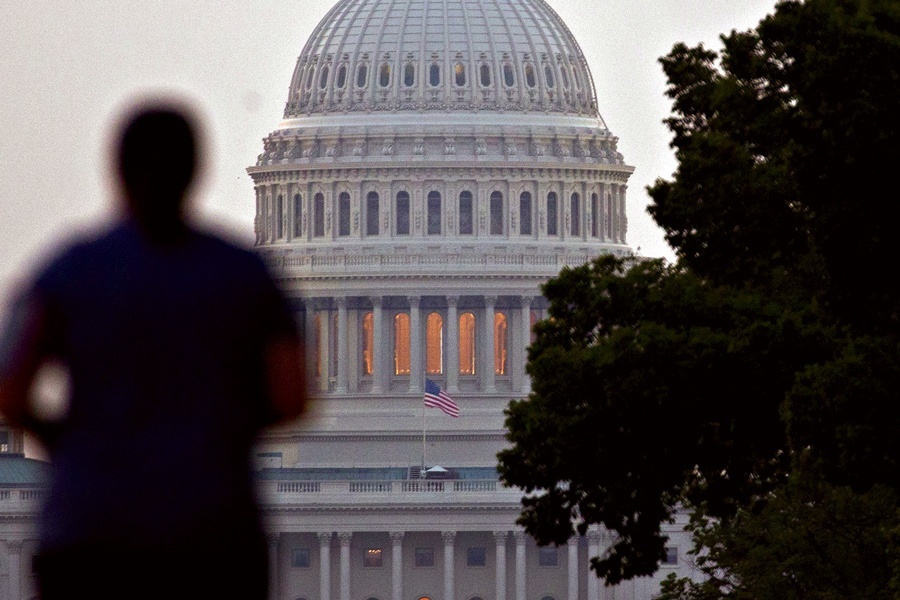

Legislation that would renew expired small-business tax breaks and bolster the child tax credit faces a difficult legislative path, even with initial support on both sides of the aisle.
A separate bill introduced late last week that would end the estate tax has almost no hope of enactment this year but serves as a marker for tax reform efforts in 2025.
On Friday, the House Ways and Means Committee approved with overwhelming bipartisan support, 40-3, the Tax Relief for American Workers and Families Act. The measure would revive tax breaks for research and development spending, boost the deductibility of investments, such as in equipment, and business loans, increase depreciation expensing of qualifying property, and increase the child tax credit.
The small-business provisions were originally approved in a 2017 tax reform law but have expired. Altogether, the legislation that sailed through the House panel last week would provide $70 billion in tax cuts.
The bill was introduced with the backing of Rep. Jason Smith, R-Mo. and chair of the House Ways and Means Committee, and Sen. Ron Wyden, D-Ore. and chair of the Senate Finance Committee. But the bipartisan momentum doesn’t guarantee it will get through Congress this year.
Supporters of the bill have to overcome legislative obstacles that make its final passage uncertain, said Marc Gerson, a partner at Miller & Chevalier. For instance, the bill would have to pass on the House floor, where some Democrats might push for a bigger child tax credit and some Republicans might demand a provision lifting the deduction limits on state and local taxes.
In the Senate, the ranking member of the Senate Finance Committee, Republican Mike Crapo of Idaho, described the bill as a “thoughtful starting point for the House to start the process,” but he has not backed the legislation. General Senate support is unclear.
Backers also need to find must-pass legislation to which they can attach the bill. That would appear to be government funding bills and a Federal Aviation Administration reauthorization bill. If the tax bill doesn’t catch a ride on those vehicles, it may stall until the end of the year.
“Given the pending election, it will be very difficult to move a tax bill after the first quarter,” said Gerson, a former Republican tax counsel on the Ways and Means Committee. “If we miss that window, the next realistic opportunity may be a lame duck [congressional session] bill at the end of the year after the election.”
The bill could offer a boost to Noah Damsky’s clients who own and manage real estate but also must make required minimum distributions from individual retirement accounts. Increased depreciation expenses allowed by the legislation could help offset IRA distribution taxes.
“It effectively gets the money out of the IRAs while minimizing the tax hit,” said Damsky, co-founder of Marina Wealth Advisors. “This strategy can really be valuable for estate and tax planning.”
If the bigger bill bogs down, it’s not likely the small-business tax deductions will be able to make it through Congress on their own.
“I don’t see them moving independently of the larger package,” Gerson said.
Although the estate tax bill was introduced with more co-sponsors this year – 162 – than similar legislation garnered in a previous Congress, it is a much longer shot to be enacted before the end of the year. Only one Democrat – Rep. Sanford Bishop of Georgia – has signed on so far. The issue is one that tends to raise partisan temperatures.
But the legislation could help set the context for congressional negotiations next year over expiring individual tax cuts in the 2017 law.
“The increase in co-sponsors shows the death-tax repeal will be a top priority for Republicans approaching the next tax reform bill in 2025,” said Palmer Schoening, chair of the Family Business Coalition.
The outcome of the election will likely influence how tax reform unfolds in 2025. Control of the White House, House and Senate are all expected to be decided by narrow margins.
“It’s hard to predict the outcome of the election,” Gerson said. “It seems very likely we’ll end up with divided government.”
Republican presidential candidates favor killing the estate tax, Schoening said.
“I’m confident if President Biden wins, he would continue his efforts to expand the estate tax rather than repeal it,” he said.
Bloomberg News contributed to this report.

While industry statistics pointing to a succession crisis can cause alarm, advisor-owners should be free to consider a middle path between staying solo and catching the surging wave of M&A.

New joint research by T. Rowe Price, MIT, and Stanford University finds more diverse asset allocations among older participants.

With its asset pipeline bursting past $13 billion, Farther is looking to build more momentum with three new managing directors.

A Department of Labor proposal to scrap a regulatory provision under ERISA could create uncertainty for fiduciaries, the trade association argues.

"We continue to feel confident about our ability to capture 90%," LPL CEO Rich Steinmeier told analysts during the firm's 2nd quarter earnings call.
Orion's Tom Wilson on delivering coordinated, high-touch service in a world where returns alone no longer set you apart.
Barely a decade old, registered index-linked annuities have quickly surged in popularity, thanks to their unique blend of protection and growth potential—an appealing option for investors looking to chart a steadier course through today's choppy market waters, says Myles Lambert, Brighthouse Financial.
